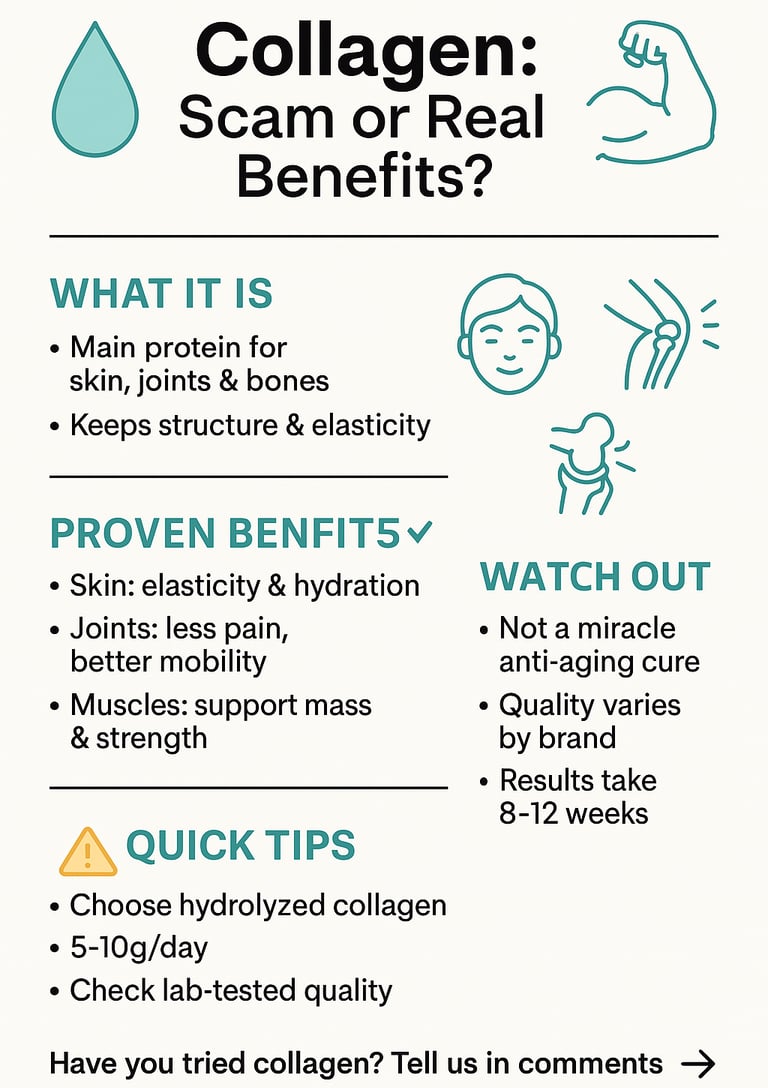Collagen: Scam or Real Benefit?
Is collagen just another overhyped wellness trend, or does it truly benefit your health? Discover the science, potential uses, and myths around collagen supplements.
WELLNESSHEALTHBLOG-LIST
8/10/20252 min read


📝 Summary Collagen is a key structural protein in the body, essential for skin, joints, bones, and connective tissues.
Supplements may improve skin elasticity, joint comfort, and recovery but scientific evidence varies by claim.
Not all collagen products are created equal; quality and dosage matter.
For some people, benefits are visible, but it’s not a miracle cure.
📖 Introduction
Collagen has exploded in popularity over the past few years, appearing in powders, capsules, drinks, and even coffee creamers. Promises range from glowing skin to pain-free joints and stronger hair and nails.
But is collagen really the secret to anti-aging and better health, or just another expensive wellness fad?
In this article, we’ll examine what collagen is, what science says about its effectiveness, and how to tell if it’s worth your money.
📚 Table of Contents
🧬 What Is Collagen?
Collagen is the most abundant protein in your body, making up about 30% of total protein mass.
It acts like the “glue” that holds everything together providing structure and elasticity to skin, cartilage, bones, and connective tissue.
💪 Why the Body Needs Collagen
Skin: Maintains elasticity and hydration.
Joints & Cartilage: Supports cushioning and mobility.
Bones: Contributes to strength and structure.
Muscles & Tendons: Helps maintain flexibility and strength.
🥤 Collagen Supplements: How They Work
Most supplements contain hydrolyzed collagen peptides, broken down into smaller amino acids for better absorption.
Once digested, these amino acids may stimulate the body’s own collagen production.
🌟 Potential Benefits Backed by Science
Improved Skin Health – Some studies show better elasticity, hydration, and reduced wrinkles after 8–12 weeks of supplementation.
Joint Pain Relief – May reduce discomfort in athletes and people with osteoarthritis.
Bone Health – Early research suggests it can support bone density when combined with other nutrients like vitamin D and calcium.
Muscle Mass Support – May assist in preserving lean muscle during aging when combined with resistance training.
⚠️ Limitations and Myths
Collagen is not a miracle anti-aging solution.
Not all claims (like dramatic hair growth or cellulite removal) are strongly supported by science.
Quality varies widely, some products contain low doses or unnecessary fillers.
🛒 Choosing the Right Collagen Supplement
Look for Type I and Type III collagen for skin, hair, and nails; Type II for joints.
Choose hydrolyzed collagen peptides for better absorption.
Check dosage (generally 5–10 g/day).
Prefer brands with third-party testing for purity.
❓ FAQ – Frequently Asked Questions
1. Can collagen really make you look younger?
It can improve skin elasticity and hydration, but it won’t reverse aging completely.
2. Is collagen safe for everyone?
Generally yes, but those with allergies to the source (fish, bovine) should avoid certain types.
3. How long before I see results?
Most studies report visible effects after 8–12 weeks of consistent use.
4. Do I need supplements if I eat a balanced diet?
A diet rich in protein can support collagen production, but supplements may offer additional targeted benefits.
📌 Conclusion
Collagen is not a scam but it’s also not a magic bullet.
Scientific evidence supports certain benefits, especially for skin and joint health, but results vary between individuals. If you choose to take it, focus on quality, consistency, and realistic expectations.
